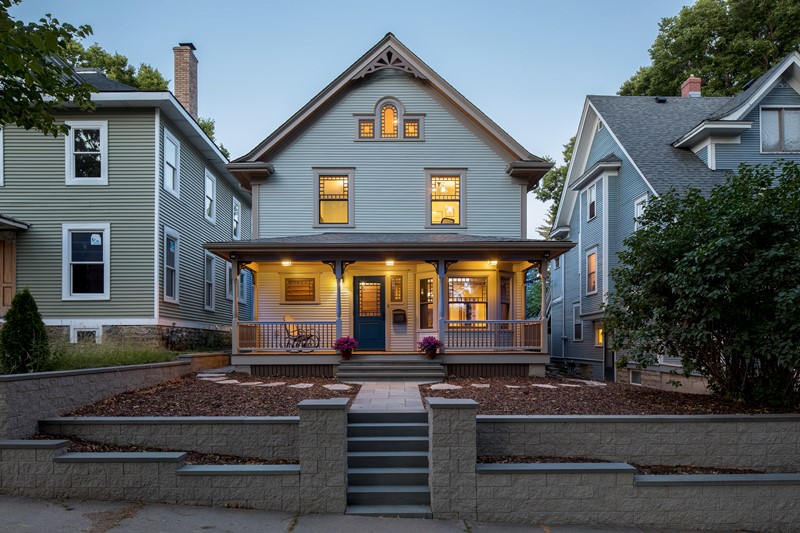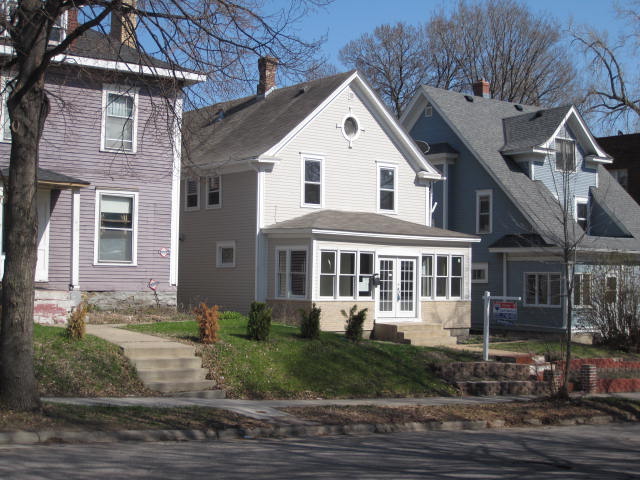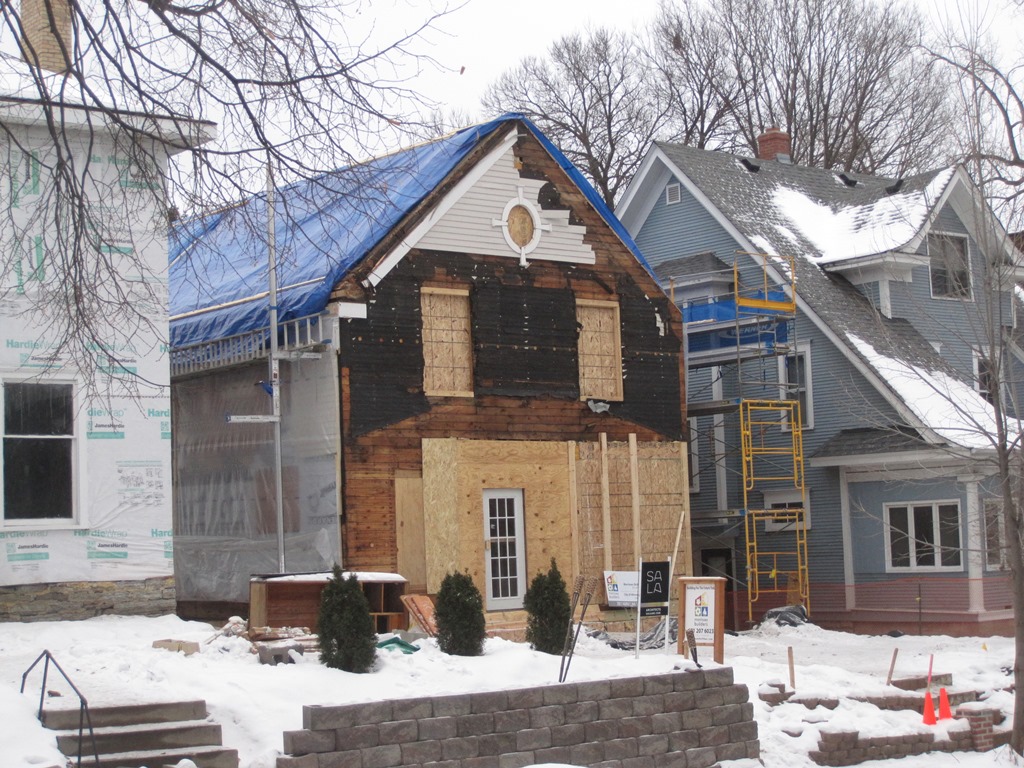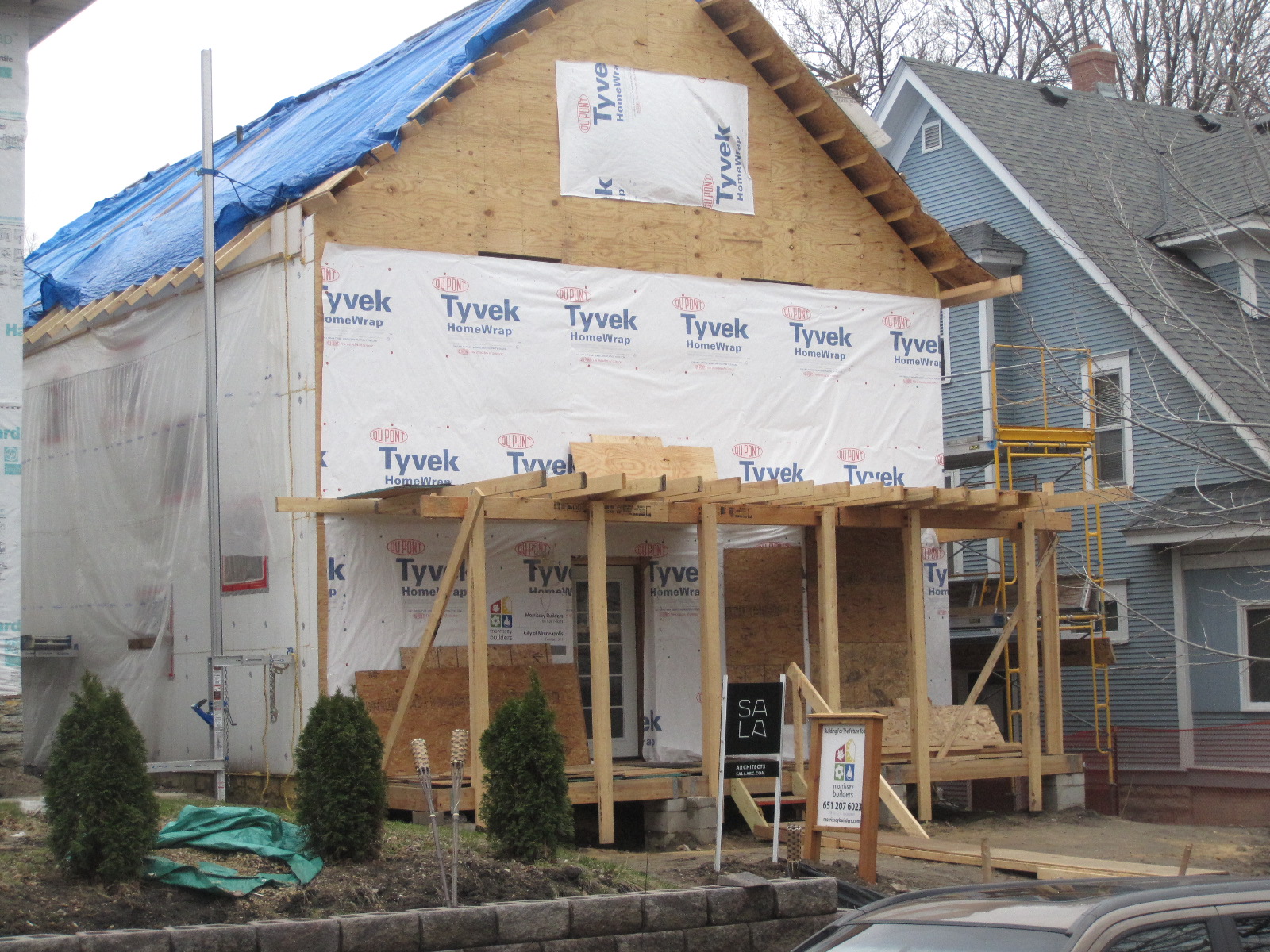Project Subtitle:
Project Description:
Two retired professors, Linda and Stewart Herman, wanted to show that a standard city house on a standard city lot in chilly Minneapolis could be renovated to net zero in energy with no sacrifice in attractiveness, space or comfort. These goals were achieved with the 2015-2016 renovation of a 1907 balloon-frame house on a 40x130-foot lot in the Whittier neighborhood. Design was by SALA Architects of Minneapolis, MN; engineering by Align Structural of Minneapolis, and construction by Morrissey Builders of St. Paul, MN.
The four 'legs' of our net-positive house:
a. 54 solar collectors (42 on house, 12 on garage) for a 17kW capacity;
b. 4 250' deep geothermal wells in a 30 x 40 foot backyard;
c. Insulation: PERSIST exterior insulation system (R-40 in the walls, R-80 in the roof) and the Cocoon system for insulating the basement from exterior (R-30), and triple-glazed windows throughout.
d. Tight envelope: 3M ice-and-water plus extensive sealing around all openings keeps the infiltration rate to 350 at CFM50, or .05 CFM per square foot of building area shell surface. It exceeds code for tightness by five times.
To save energy, the house uses a geothermal heat pump, a heat-pump driven water heater, and a ventless heat-pump driven dryer. It is ventilated by an ERV (drawing exhaust air from kitchen and bathrooms). When the range hood operates, cooler makeup air is drawn past the refridgerator coils for more efficient cooling. The wallboard is of a new type (Certainteed 'Air-Renew') that absorbs formaldehyde for a promised ten years. All lighting is LED, whether in traditional fixtures, cans or other locations.
Attractiveness:
The interior of the total gut rehab involved a) retaining the original birch flooring (first floor) and installing recycled maple flooring harvested from three Twin Cities houses being demolished (2nd floor). The original yellow-birch millwork (window, door casings and baseboard) was refinished and reinstalled. Supplementary millwork is also regionally sourced yellow birch, milled in the same design as the original. For the comfort of the retired couple that lives there, the stairwell was widened to 4 feet and key doorways to 3 feet for wheelchair access. The bathrooms have rails, the cabinets have pull-outs, the drawers are soft-close.
'Aging in place': Since the owners are already in their later 60s, and hope to live in the house for as long as they are able, the house incorporates many design features from the National Association of Homebuilders to enable occupants to live in a house well into their old age: an easily rampable rear entry, on one level; 36" wide doorways to accommodate wheel chairs; wide turning places; a 4-foot wide stairway between floors; soft close cabinets in kitchen, base cabinets with pullout shelving; easily manipulable faucets; wall-mounted toilets (for easy cleaning); bright LED lighting throughout; sensor lighting on exterior; lever door handles on exterior doors; low-maintenance exteriors including porch decking; washing and drying machines raised 12" above floor; side-by-side refridgerator; laundry chute; grab bars in bathrooms including shower and tub; brightly-lit closets; etc.
Landscaping:
The yard is bordered by hardscape--Versalok blocks capped with NY Bluestone (also used for the front walk and terracing). 2500 square feet of the yard is planted in a variety of Minnesota perennials, mostly drought tolerant. A three-zone drip irrigation system is installed to carry these plantings through a dry summer. A much smaller slice of the yard is planted in Kentucky bluegrass, with no installed irrigation.
Building Type Summary:
Other Awards:
10th Annual Green Home of the Year Award - Green Builder
https://www.greenbuildermedia.com/design/10th-annual-green-home-of-the-y...
Address:
Elevation:
Lat. / Long.:
Location Type:
Climate Region:
Occupancy Type and Details:
home for retired couple. Live here all year around; not snowbirds.
Conditioned Floor Area:
Conditioned Building Volume:
Unconditioned Floor Area:
Multiple buildings?:
Total number of units in project (all buildings):
Total floor area of project (all buildings):
Historic?:
Completion date:
Site description:
Typical tired old urban house on typical urban plot (40x 120)
Materials:
Flooring and millwork were regionally sourced (Wisconsin)
low-VOC paints
wallboarding that absorbs formaldehyde
HERS Index:
Annual renewable energy generated:
Electric Utility Company:
Gas Utility Company:
Datasets and Utility Bills sources and reliability:
utility bills, presumed reliable
Electricity amount (imported from grid):
Electricity amount (credited or exported to grid):
Net electricity usage (purchased electricity):
Energy Storage Capacity:
Energy Storage type:
None.
Subslab assembly:
Basement floor removed; new slab poured on top of 2" foam.
Slab edge assembly:
"Cocoon" system: pressure jet and vacuum used to excavate 4" around foundation, down to footing. Then 1" EPS foam inserted, and the gap between foundation wall and foam sheet was filled with more foam squirted in.
Foundation wall assembly:
Existing foundation variously reinforced concrete or stone. Little R value.
"Cocoon" system: pressure jet and vacuum used to excavate 4" around foundation, down to footing. Then 1" EPS foam inserted, and the gap between foundation wall and foam sheet was filled with more foam squirted in.
Above grade wall assembly:
joists extended to provide support for new exterior wall. See PERSIST description above
Cathedral ceiling assembly:
Attic space has no insulation in floor. All insulation above inner (old) roof.
Door Area:
Space heating - Manufacturer & Model:
Space cooling - Manufacturer & Model:
Domestic hot water - Manufacturer & Model:
Domestic hot water - capacity:
Ventilation - Manufacturer & Model:
Process:
mid-2014 competitive selection of architect
late 2014-mid 2015 - from conceptual to construction drawings
Design for Adaptability:
blueprints retained but idiosyncratic to this particular house renovation
Gross Cost of Renewable Energy System:
Value of Tax Credits for renewable energy systems:
Net Cost of renewable energy systems:
Federal incentives:
1/3 for solar and geothermal systems
Utility incentives:
surplus solar power purchased by utility for ~10 cents per kWhr
Solar Rewards (Renewable Energy Certificates) purchased for 8 cents / kWhr
Annual Electric Savings:
Annual Revenue from SRECs or other renewable energy credits:
Advice:
Go for federal incentives and utility incentives!
NESEA Awards:
none
Published References:
Special architectural measures:
modest passive solar--extended eaves
solar heat gain/loss film on windows optimized for window location
Energy Use and Production Documentation:
Subslab R-value:
Slab edge R-value:
Foundation wall R-value:
Above grade wall R-value:
Average window U-factor:
Solar Heat Gain Coefficient:
Air Changes per hour, ACH50:
Project Photos:





Number of Bathrooms:
Scope Description:
Total gut rehab, affecting 99% of structure
Site conditions:
Renewable Energy Sources:
Summary of enclosure strategy/description:
PERSIST concept (Canadian): insulate exterior of house. Strip down to sheathing; apply ice and water, then 7.25" EPS foam in 4x8' blocks. Then apply 5/8" plywood for strength. Then Tyvek. Then furring strips. Then lap siding. See pictures
Roof Assembly:
Old roof retained; new roof built over. Ridge beam (18" x 6") inserted under peak, supported by steel posts running down interior of interior walls to reinforced concrete pads in basement. New roof consists of 14" high OSB I-beams, 21" on center, gaps filled with about 10" of squirted foam (LaPolla). Then 2x6"s laid vertically crosswise, and plywood attached to them. Large air space kept, vented at eaves. Roofing is 30-year shingles. Total R-value is 80, including batt insulation tucked into 2x6"s under old roof.
Roof R-value:
Window Description:
Anderson Windows& Doors. A- series, all triple-glazed.
Door Description:
Andersen Windows & Doors.
Number of Bedrooms:
Team Members:
Marc Sloot, SALA Architects, Minneapolis.
Katie Leaf, SALA
Sean Morrissey, builder

Mechanical Equipment Installation Details and Comments:
heat pump for HVAC - COP 5
350 CFM50 (heating and cooling) as measured by blower door test